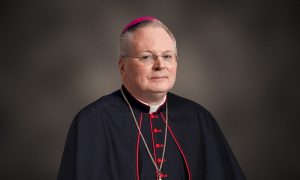
by_maxbelchenko_Adobe Stock
By Andrea Gibbs
On May 15, the Catholic Church celebrates the one-year anniversary of the canonization of St. Charles de Foucauld: French soldier, explorer, geographer and hermit. Although St. Charles was martyred in 1916, long before the dawn of the digital world and social media, his life’s work and his writings have much to teach us today as we navigate the ever-changing platforms online.
Recent studies report that the average American spends between five and six hours online daily, outside of their business requirements. These statistics tell us what we often avoid thinking about: we are spending the majority of our waking hours staring at a screen. This leads us, as Catholic Christians, to ponder whether we are being authentic and charitable with our online interactions, and whether we are acting as influencers or the ones being influenced.

St. Charles de Foucauld is sometimes quoted as saying, “Above all, always see Jesus in every person, and consequently treat each one not only as an equal and as a brother or sister, but also with great humility, respect and generosity.” So often we see that dialogue online comes to a head as we feel the need to be right, at all costs. The back-and-forth arguing often leads to uncharitable words on both sides, even if the original intent was to defend the Church and her teachings.
When we are behind a keyboard or a phone screen, it is all too easy to lose perspective of the person on the other side, the person who is made in the image and likeness of God. Taking a physical step back to pray about the direction of the online discussion can often help reorder our thoughts.
When we are interacting online with someone, and he or she says something we know to be absolutely false, we can politely challenge this person’s error. Often, people don’t want to be wrong. The frustration that comes from an interaction like this tends to pull us in, as we give up so much mental energy and emotion. It can be a hard line to walk when we are passionate about a triggering post or discussion—how much to say, how much time to invest in the discussion, and how much we will let that discussion influence our emotions throughout the remainder of the day.
For many others, it is not as much of a challenge to just scroll past the controversy online. They are able to not get heavily emotionally invested in those posts meant to trigger and cause reactions. Even for them, the time spent reading online posts still can have an effect.
Emily Leedom serves as executive director of The Lourdes Center, a ministry of the Diocese of Sioux Falls that serves clients facing a variety of issues including depression, anxiety, grief, trauma and family difficulties. She says that although they have no way to specifically track the correlation of social media to the clients they serve, they do see the subtle effects of it often taking a toll on people, whether they realize it or not.
“Boundaries are essential in order to embody healthy online behavior,” Emily says. “These boundaries include what you share, how much time you spend on it, how much influence a platform has on your emotions, and how much mental energy the platform consumes.
“More than ever before, it is my belief that we need heroic virtue and faithful ‘influencers’ on our social platforms,” Emily continued. “We need authentic disciples who are on the journey that are willing to testify to what God is doing. We also need disciples who can witness to an integrated life of beauty, goodness and truth. However, to be an authentic witness online does not mean that the world must have full access to one’s life.”

This all leads us back to St. Charles de Foucauld’s ministry. He deeply desired to influence others. Throughout his life, he spent a great deal of time writing to several orders hoping to form communities of religious. Year after year, time moved on without a religious order ever coming to fruition for him.
Charles instead spent his time invested heavily in the people around him. He was able to be the voice, hands and feet of Christ to those in his community, rather than spending too much time hoping for an influence on those far away. He wrote, “To love anyone is to hope in him for always. From the moment at which we begin to judge anyone, to limit our confidence in him, from the moment at which we identify him with what we know of him and so reduce him to that, we cease to love him and he ceases to be able to be better.”
St. Charles was able to interact with others genuinely, having influence far beyond his expectations. He teaches us that it is important to dialogue with everyone and to keep open lines of communication with those of differing beliefs. Now, some 100 years after his death, more than a dozen religious orders and communities have sprung up from his writings and his life of ministry.
Our interactions, both in person and online, will have lasting effects on others, for better or worse. Emily adds, “Who we are online should flow directly from who we are in our friendships, workplaces and communities. While different elements of our personality might shine in different environments, they should never contradict.” Perhaps then we should each continue to monitor our own interactions with others to keep healthy boundaries and influence, and lead others to Christ.
St. Charles de Foucauld, pray for us.


